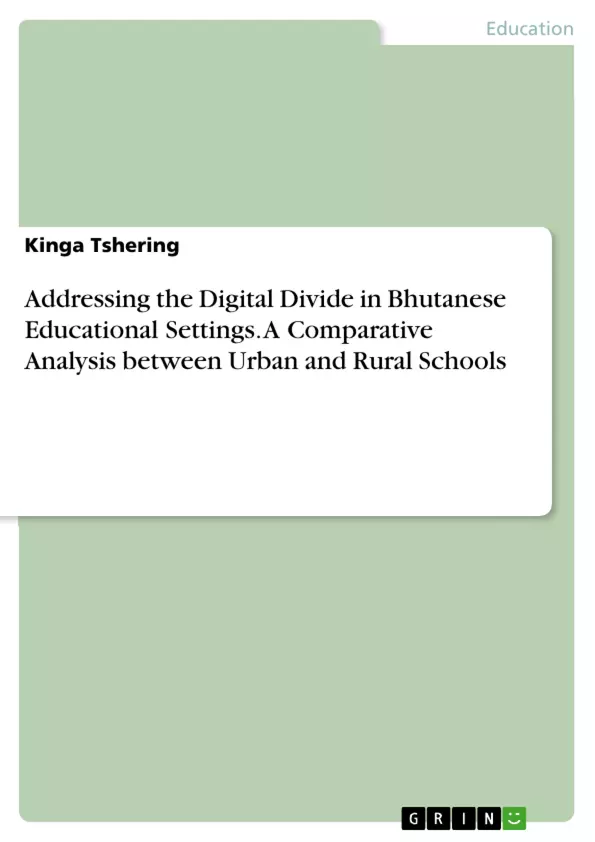The article delves into the existing digital divide in Bhutan's educational scenario, specifically examining and evaluating the digital divide between urban and rural schools. Although the government has initiated various policies incorporating technology into education, the digital gap persists, obstructing equitable access to learning resources in rural and urban parts of Bhutan.
The article specifies socio-economic factors, feasibility challenges, and gaps in training as factors that led to the digital divide. The article also identifies the importance of political initiatives in development of infrastructures and policy decisions, focusing on comprehensive and inclusive governmental policies for both rural and urban settings.
The article recommends citizenship actions to curb the issues of the digital divide, including more budget allocation, subsidized internet services and charges, digital literacy programs, and teacher and student professional development, especially in rural settings. However, issues such as increased budget approval, implementation of policy, infrastructural limitations, and diverse linguistic settings in rural areas still remain challenges.
Solving the digital gap is of paramount importance for Bhutan's overall socio-economic development, increasing educational and employment opportunities, and facilitating innovation in both urban and rural communities. The article suggests collaborative actions from stakeholders for digitally inclusive Bhutan and highlights recommendations for policymakers, educators, and communities.
Inhaltsverzeichnis (Table of Contents)
- Introduction
- Probable suggestions for fostering citizenship action
- The government should prioritize allocating more budget to rural settings.
- Digital literacy program and advocacy
- Teacher and student training and support in the rural part of Bhutan
- Promotion of community initiatives
- Challenges
- Budget allocation and approval challenges
- Policy implementation challenges
- Infrastructures limitation
- Digital literacy and advocacy programs
- Conclusion
Zielsetzung und Themenschwerpunkte (Objectives and Key Themes)
This research paper examines the digital divide in Bhutanese educational settings, focusing on the disparity between urban and rural schools in their integration of digital technology. It investigates the causes of this divide, exploring factors such as infrastructure limitations, financial constraints, and the lack of inclusive government policies. The study highlights the importance of closing this gap to ensure equitable access to quality education for all Bhutanese students.
- The digital divide in Bhutanese education
- Causes of the digital divide between urban and rural schools
- The impact of the digital divide on educational opportunities
- Suggestions for mitigating the digital divide
- The role of government policy and community initiatives
Zusammenfassung der Kapitel (Chapter Summaries)
The introduction provides an overview of the digital divide in education, highlighting its presence both globally and in Bhutan. It explores the various factors contributing to this divide, including socioeconomic disparities, lack of infrastructure, and inadequate training. The paper then delves into the specific challenges faced by Bhutan in bridging the digital divide in its educational settings, emphasizing the disparities between urban and rural schools.
The section on "Probable suggestions for fostering citizenship action" presents a series of recommendations to address the digital divide. These suggestions include increasing government funding for rural schools, promoting digital literacy programs and advocacy initiatives, and providing training and support for teachers and students in rural areas.
The "Challenges" section examines the specific obstacles hindering the integration of technology in rural Bhutanese schools. These include budget allocation issues, policy implementation challenges, infrastructure limitations, and the need for robust digital literacy and advocacy programs.
Schlüsselwörter (Keywords)
The key themes and concepts explored in this paper include digital divide, educational technology, rural development, Bhutanese education, policy analysis, infrastructure, digital literacy, and community engagement. The research focuses on the disparities in access to and use of technology between urban and rural schools in Bhutan, analyzing the contributing factors and recommending solutions for bridging this gap.
- Quote paper
- Kinga Tshering (Author), 2023, Addressing the Digital Divide in Bhutanese Educational Settings. A Comparative Analysis between Urban and Rural Schools, Munich, GRIN Verlag, https://www.grin.com/document/1443304



